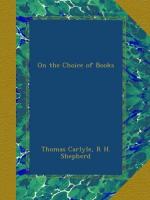The translation of “Wilhelm Meister,” in 1824,[A] was the first real introduction of Goethe to the reading world of Great Britain. It appeared without the name of the translator, but its merits were too palpable to be overlooked, though some critics objected to the strong infusion of German phraseology which had been imported into the English version. This acquired idiom never left our author, even in his original works, although the “Life of Schiller,” written but a few months before, is almost entirely free from the peculiarity. “Wilhelm Meister,” in its English dress, was better received by the English reading public than by English critics. De Quincey, in one of his dyspeptic fits, fell upon the book, its author, and the translator,[B] and Lord Jeffrey, in the Edinburgh Review, although admitting Carlyle to be a talented person, heaped condemnation upon the work.
[Footnote A: Wilhelm Meister’s Apprenticeship. 3 Vols., Edinburgh, 1824.]
[Footnote B: Curiously enough in the very numbers of the “London Magazine” containing the later instalments of Carlyle’s Life of Schiller.]
Carlyle’s next work was a series of translations,
entitled “German
Romance: Specimens of the chief Authors; with
Biographical and
Critical Notices.” 4 vols. Edinburgh, 1827.
The Preface and
Introductions are reprinted in the second volume of
Carlyle’s
Collected Works: the Specimens translated from
Hoffmann and La Motte
Fouque, have not been reprinted.
“This,” says Carlyle, in 1857, “was a Book of Translations, not of my suggesting or desiring, but of my executing as honest journey-work in defect of better. The pieces selected were the suitablest discoverable on such terms: not quite of less than no worth (I considered) any piece of them; nor, alas, of a very high worth any, except one only. Four of these lots, or quotas to the adventure, Musaeus’s, Tieck’s, Richter’s, Goethe’s, will be given in the final stage of this Series; the rest we willingly leave, afloat or stranded, as waste driftwood, to those whom they may farther concern.”
It was in 1826 that Mr. Carlyle married Miss Jane Welsh, the only child of Dr. John Welsh, of Haddington,[A] a lineal descendant of John Knox, and a lady fitted in every way to be the wife of such a man. For some time after marriage he continued to reside at Edinburgh, but in May, 1828, he took up his residence in his native county, at Craigenputtoch—a solitary farmhouse on a small estate belonging to his wife’s mother, about fifteen miles from Dumfries, and in one of the most secluded parts of the country. Most of his letters to Goethe were written from this place.
[Footnote A: Her father had been dead some seven years when Carlyle and she were married, and the life interest of her inheritance in the farm of Craigenputtoch had been made over to her mother, who survived until 1842, when it reverted to Carlyle.]
In one of the letters sent from Craigenputtoch to Weimar, bearing the date of 25th September, 1828, we have a charming picture of our author’s seclusion and retired literary life at this period:—




